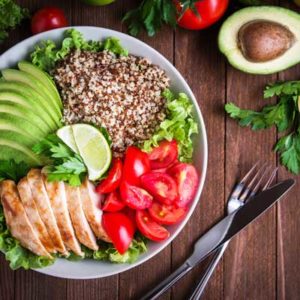Eating a balanced diet with plenty of whole plant foods, healthy proteins and fat sources, and high in antioxidants is key to optimal health. Dietitians and nutritional consultants support consuming an anti-inflammatory, antioxidant diet aimed at decreasing inflammation and oxidative stress and promoting a healthy immune balance.
Anti-inflammatory foods reduce inflammatory proteins in the body, while antioxidants help destroy the oxidative compounds, mainly “free radicals,” that damage healthy cells.
Chronic inflammation is recognized as a risk factor for numerous degenerative diseases, including heart diseaseheart disease : an abnormal condition of the heart or of the heart and circulation (such as coronary heart disease, arrhythmia, or heart-valve defect), diabetes, autoimmune conditions, Parkinson’s disease, Alzheimer’s disease and Multiple Sclerosis.
Healthy inflammatory response versus chronic inflammation
Inflammation is a vital function of our immune systemimmune system : the bodily system that protects the body from foreign substances, cells, and tissues by producing the immune response and that includes especially the thymus, spleen, lymph nodes, special deposits of lymphoid tissue (as in the gastrointestinal tract and bone marrow), macrophages, lymphocytes including the B cells and T cells, and antibodies.. In a healthy person, the inflammatory response – swelling, heat, fever or redness – will alert the body to infectioninfection in·fec·tion | \ in-ˈfek-shən a : the state produced by the establishment of one or more pathogenic agents (such as a bacteria, protozoans, or viruses) in or on the body of a suitable host b : a disease resulting from infection and trigger our immune system. When acute inflammation occurs, the body’s white blood cells (leukocytes) and substances they produce, cytokines, are recruited to repair tissue damage such as a cut or bug bite and fend off viruses and bacteria.
In some diseases, the immune system triggers an inflammatory response when no foreign cells are present, causing the body to attack itself, leading to tissue and organ damage.
An overactive immune system triggered by overproduction of cytokines is an area of research into the sickest of patients infected with coronaviruscoronavirus co·ro·na·vi·rus : any of a family (Coronaviridae) of single-stranded RNA viruses that have a lipid envelope studded with club-shaped projections, infect birds and many mammals including humans, and include the causative agents of MERS, SARS, and COVID-19. Scientists are researching an arthritis drug as a potential treatment for cytokine storm syndrome. This autoimmune disorder is what is believed to trigger persistent high fever, severe respiratory distress and lung damage found in severely ill COVID-19COVID-19 \ ˈkō-vid-nīn-ˈtēn : a mild to severe respiratory illness that is caused by a coronavirus (Severe acute respiratory syndrome coronavirus 2 of the genus Betacoronavirus), is transmitted chiefly by contact with infectious material (such as respiratory droplets), and is characterized especially by fever, cough, and shortness of breath and may progress to pneumonia and respiratory failure. patients.
Research has discovered a close association between some autoimmune diseases such as diabetes, rheumatoid arthritis (RA), inflammatory bowel disease (IBD), Lupus, asthma and chronic inflammatory disease. Inflammation in the nervous system occurs in early Parkinson’s disease and accelerates the degeneration of cells that produce dopamine, which is key to movement.
Symptoms of inflammation can include lower back pain, joint pain and tiredness. It also contributes to arteriosclerosis, a build up of fatty plaque inside the arteries, the main cause of heart attack and stroke.
Best Diets for Anti-Aging
The DASH diet and Mediterranean diet are recognized among the best diets for healthy eating and anti-aging. (Check out this Guide to Lowering Your Blood Pressure with DASH from the National Institutes of Health.) Both are rich in whole plant foods, such as fruits, dark leafy vegetables, whole grains, legumes, nuts, and seeds and rich in healthful fat sources like extra-virgin olive oil, avocado, nuts, and oily fish like tuna and salmon. They also include foods such as tea, dark chocolate, spices and herbs.
Anti-Inflammatory Foods to Maintain Immune Balance

Research shows that eating certain foods can help ease symptoms of inflammation and decrease flare-ups. As a rule, fresh is better than processed or prepared foods. Prepared foods often have added gluten, preservatives, flavorings or chemicals. When you cook your own meals you can control oils, fats and salt. Aim to do more food prep and cooking at home, starting with whole foods including vegetables, beans and whole grains.
Rich Proteins
Lean meats such as pork, poultry, lean beef and fish, eggs, cheese, and protein-rich foods like cottage cheese, yogurt, tofu, almonds, broccoli, and beans.
Fruits and Vegetables
A colorful plate is a good rule to consider when preparing a meal, generally the darker the better. Think vegetables like kale, spinach, zucchini, broccoli, tomatoes, peppers and green beans and fruits like blueberries, raspberries and oranges
Herbs & Spices
Herbs and spices such as turmeric, cayenne, cinnamonCinnamon is a known anti-infective agent, capable of reducing bacterial, fungal, and protozoa burden. and ginger are known for their anti-inflammatory properties. Turmeric has been used for thousands of years in mustards and curries as well as a treatment in Ayurvedic and Chinese medicine traditions. Available as a supplement, turmeric provides support for good joint health, chronic inflammation and to reduce the effects of osteoarthritis and rheumatoid arthritis. Cinnamon is known for its antimicrobial, anti-inflammatory and antioxidant properties. Research on the health benefits of cinnamon has shown potential for treating diabetes, heart disease and high blood pressure. Shop Good Medicine ChoiceTM Network for our doctor-approved antioxidant and anti-inflammatory supplement products.
Water, Tea, Coffee
Staying hydrated is an important part of digestion. Your body requires about two quarts or two liters of water a day. Drink plenty of fluids, such as water, broth, tea and even red wine. Consume foods with high water content, such as watermelon, oranges, cantaloupe, cucumber, celery, tomatoes, cabbage and spinach.
Remember, the focus should be to identify and eliminate inflammatory foods and nourish with real foods that deliver vitamins, minerals, and antioxidants.


No comments yet. Be the first one to leave a thought.